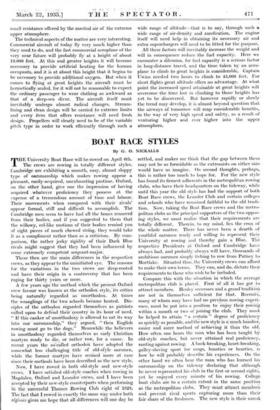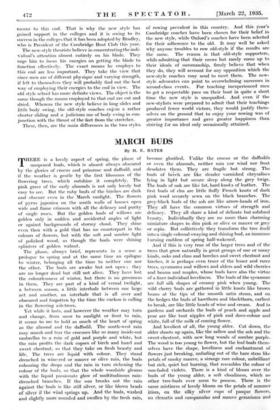BOAT RACE STYLES
By G. 0. NICKALLS
rivals might suggest that they had-been influenced by . . some extremely 'Competent sergeant-major.
These then are the main .differences in the respective crews, as they appear to theithinitiited eye. The reasons for the variations in the two eresYs are deep-rooted and have their origin in 'a controversy that has been raging for thirty -3' ,eirs or more A few years ago-- the Method which the present Oxford crew favour was linOmii as the orthoddi. style;:its Critic's being naturally 'regarded did 'as unOithOckix. At tithes the wranglings of the two. schools became heated. Dis- ciples of the orthodok regarded themselves as patriots called upon to defLd *their r.country in its hOur of need. " If this eanker of undithodoxY is allOiyed to eat its way into our oarsthanship," they argued, " then English rowing must go to the dogs." Meanwhile the believers in unorthodoxy regarded themselves as early Christian martyrs ready to die, or rather row, fora cause. In recent years the sot'eilled orthodok. have adopted the somewhat less challenging title of old-style oarsmen, while the former martyrs hive seemed more at ease since their methods have been described as the new style.
NOw, I have rowed in both old-style and new-style crews. I have satisfied old-style coaches when rowing in Magdalen, Oiford and Leander 'crew's; and I have _been accepted by their new-style Counterparts when performing iti the successful Thames. Rowing Club eight of .1928. The fact that I rowed in exactly the same way- under both regimes gives me hope that all differences will one day be settled, and makes me think that the gap between them may not be as formidable as the extremists on either side would have us imagine. On second thoughts, perhaps, this is rather too much to hope for. For the new style has found its firmest adherents in themetropolitan rowing clubs, who have their headquarters on the tideway, while until this year the old -style. has had. the .support of both Boat Race crews, the Leander Club and certain colleges and schools who have remained faithful to the old tradi- tion. Nov, taking the Boat Race crews and the metro- politan clubs asthe principal supporters of the two oppos- ing styles, we must realize that their requirements are totally different. Therein, to my mind, lies the crux of the whole matter. There has never been a 'dearth oaf youthful oarsmen • ready and willing to represent their University at rowing and thereby gain a Blue. The respectiVe Presidents at Okford and Cambridge • haVe always had, and probably always will have, thousands of ambitious oarsmen simply itching to row from Putney to Mortlake. Situated thus, the University crews can afford to make their own terms. They can, and do, dictate their requirements to those who wish to be included.'
Compare this with the situation in which the average Metropolitan club is plaCed.:: First of all it hai.gOt tip attract 'members. Henley successes and a grand'traditidii are not in themselves 'sufficient fcir that. Recruits, many of whom may have had no previous rowing experi- ence, - ". must be put into a position to 1- enjoy their rowing within a ,month or two of joining the club. They must be helped to attain " a certain " degree of prnficiency as quickly as possible, and the new style is a: much handier, easier and surer method of achieving it thin the old. How often one hears the man, who 'hai been taught by old-style coaches, but never attained real proficiency, ranting against rowing. A back-breaking, heart-breaking, galley-slaving sport for mugs, lunatics or hearties, is how he will probably describe his experiences. On the other hand we often hear the. man who has learned hiS oarsmanship on the tideway declaring that although, he never represented his club in the first or second eights, yet he enjoyed every minute of his rowing. College boat clubs are to a certain extent in the same position as the metropolitan clubs. They must attract members and prevent rival sports capturing more than their fair share of the freshmen. The new style is their surest means to this end. That is why the new style has gained support in the colleges and it is owing to its success in the colleges that it has been adopted by Bradley, who is President of the Cambridge Boat Club this year.
The new-style theorists believe in concentrating the indi- vidual's attention almost entirely on his blade. They urge him to focus his energies on getting the blade to function effectively. The exact means he employs to this end are less important. They take the view that since men arc of different physique and varying strength, if left to themselves they will probably find out the best way of employing their energies to the end in view. The old style school has more definite views. The object is the same though the means employed to that end are cut and dried. Whereas the new style believe in long slides and little body swing, the old-style coaches enjoin a rather shorter sliding and a judicious use of body swing in con- junction with the thrust of the-feet from the stretcher.
These, then, are the main differences in the two styleS of rowing prevalent in this country. And this year's Cambridge coaches have been chosen for their belief in the new style, while Oxford's coaches have been selected for their adherence to the old. It may well be asked why anyone troubles to row old-style if the results are the same. The reason is that old-style supporters, while admitting that their crews but rarely come up to their ideals of oarsmanship, firmly believe that when they do, they will account for any opposition which the new-style coaches may send to meet them. The new- style advocates can point to overwhelming successes in second-class events. For teaching inexperienced men to get a respectable pace on their boat in quite a short time the new style is unequalled. And even if the new-stylists were prepared to admit that their teachings produced fewer world victors, they would justify them- selves on the ground that to enjoy your rowing was of greater importance and gave greater happiness than striving far an ideal only occasionally attained.





























































 Previous page
Previous page